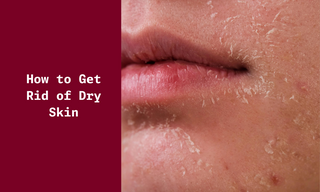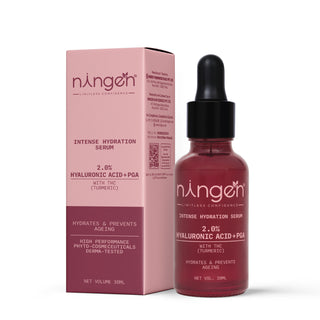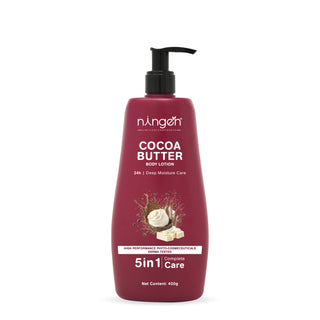Dry skin can be a real nuisance, causing discomfort and dissatisfaction with its rough and lackluster appearance. It occurs when your skin lacks moisture, making it tight and uncomfortable. It often appears rough and may even be flaky.
If you find yourself constantly battling dryness, don't worry! There are plenty of simple and effective ways to restore moisture and achieve supple, radiant skin.
Read this article to learn how to get rid of dry skin and keep it hydrated and healthy.
What Is Dry Skin?
Dry skin is a common skin condition that occurs when the outer layer of the skin lacks moisture. This can result in the skin feeling tight, itchy, and rough to the touch. It can be caused by a variety of factors, including environmental conditions, genetics, and certain lifestyle choices.
While dryness of skin is a common and often harmless condition, it can be uncomfortable and unsightly. In more severe cases, it can lead to cracking, bleeding, and infection. It is important to take steps to address and care for dry skin to prevent these complications.
Types of Dry Skin
Dry skin can be a frustrating and uncomfortable condition to deal with. Several different types of dry skin can affect people, each with its own set of symptoms and causes.
- One common type is called xerosis. This type of dry skin is often caused by environmental factors such as cold, dry weather, or low humidity. Xerosis can cause the skin to feel tight, itchy, and prone to flaking. It can also make the skin look dull and aged. Using a rich moisturizer and taking shorter, cooler showers can help alleviate the symptoms of xerosis.
- Another type is known as atopic dermatitis or eczema. This type of dry skin is often genetic and can be triggered by allergens or irritants. Atopic dermatitis can cause red, inflamed patches of skin that are extremely itchy and can even bleed if scratched. People with eczema may also experience thickened, cracked skin in the affected areas. Managing eczema often requires the use of gentle, fragrance-free skin care products and avoiding triggers such as harsh soaps and certain fabrics.
- A less common type is known as psoriasis. Psoriasis is an autoimmune condition that causes the skin to develop thick, silvery scales and red, inflamed patches. These patches can be itchy and painful, and psoriasis can also affect the nails and joints. Psoriasis treatment often involves medicated creams, phototherapy, and in severe cases, oral or injected medications.
Dry Skin Symptoms
There are several symptoms associated with dryness of the skin that can help you identify whether you are suffering from this condition.
- Itchiness: When the skin lacks moisture, it can become tight and flaky, leading to a strong urge to scratch. This can be particularly troublesome in the winter months when the air is drier, exacerbating the symptoms of dry skin.
- Redness: The lack of moisture in the skin can cause it to become inflamed, leading to a flushed appearance. This can be particularly noticeable on the face and hands, where the skin is often exposed to harsh environmental factors.
- Fine lines & wrinkles: In some cases, dry skin can also lead to the development of fine lines and wrinkles. When the skin is dehydrated, it can lose its elasticity and firmness, leading to premature aging of the skin.
- Rough skin: Dry skin can also feel rough to the touch and may appear dull and ashy in color. This is often due to a build-up of dead skin cells on the surface, which can give the skin a lackluster appearance.
If you are experiencing any of these symptoms, it is important to take steps to address your skin dryness. With the right care and attention, it is possible to reduce the symptoms of dry skin and restore a healthy, hydrated complexion.
Common causes of dry skin
Dry skin is a common problem that can be caused by a variety of factors including environmental conditions, lifestyle choices, and even genetics. Understanding about it can help individuals take steps to prevent and treat this uncomfortable and often itchy condition.
- One of the most common causes is low humidity. In colder months, indoor heating systems can strip the air of moisture, leading to dry and flaky skin. Similarly, spending time in dry climates or windy weather can also contribute to skin dehydration.
- Another common cause is excessive bathing or washing. Hot water and harsh soaps can strip the skin of its natural oils, leaving it dry and irritated. Additionally, frequent swimming in chlorinated pools can also cause skin dryness.
- Certain lifestyle habits can also contribute to dryness of skin. Smoking, excessive alcohol intake, and poor nutrition can all affect the skin’s ability to retain moisture, leading to dryness and flakiness.
- Finally, genetics can play a role in the development of dry skin. Some individuals may be predisposed to having naturally drier skin, making them more susceptible to environmental factors and lifestyle choices that can exacerbate the problem.
By understanding the common causes and taking proactive steps to prevent and treat them, individuals can maintain smooth, hydrated, and healthy skin.
How can I prevent dry skin?
Dry skin can be a pesky and uncomfortable problem to deal with, but there are steps you can take to prevent it from occurring.
- It's important to keep your skin moisturized. This means using a good quality moisturizer daily, especially after showering or washing your hands. Look for a moisturizer that contains ingredients like hyaluronic acid, glycerin, or shea butter, as these are known to be particularly effective at hydrating the skin.
- Be mindful of the products you use on your skin. Harsh soaps and cleansers can strip the skin of its natural oils, leading to dryness. Opt for gentle, fragrance-free products that are designed for sensitive or dry skin.
- It's important to drink plenty of water and maintain a healthy diet. Hydrating from the inside out is just as important as hydrating from the outside in. Make sure to drink at least eight glasses of water a day and incorporate foods rich in omega-3 fatty acids, such as salmon and flaxseeds, into your diet.
- Environmental factors that may be contributing to your dry skin. Cold, dry air, especially in the winter, can zap moisture from your skin. Investing in a humidifier for your home can help add moisture back into the air, which can in turn help prevent dry skin.
Note: Click on the link to learn more about the skincare routine for dry skin in winter.
What You Can Do: Moisturize
Moisturizing your skin is one of the most important steps in any skincare routine. Not only does it keep your skin soft and supple, but it also helps to lock in moisture and prevent dryness and flakiness.
There are a variety of moisturizers on the market, so it's important to find one that works best for your specific skin type. If you have dry skin, look for a heavier, cream-based moisturizer that will provide deep hydration. If you have oily skin, opt for a lightweight, oil-free moisturizer to avoid clogging your pores.
In addition to using a daily moisturizer, be sure to drink plenty of water throughout the day. Staying properly hydrated from the inside out is essential for maintaining healthy, moisturized skin.
You can also incorporate a hydrating serum or oil into your skincare routine for an extra boost of moisture. These products can be used alone or layered under your regular moisturizer for added hydration.
Another important step in keeping your skin moisturized is to exfoliate regularly. By removing dead skin cells, you allow your moisturizer to penetrate more deeply and effectively, keeping your skin smooth and hydrated.
Lastly, don't forget to protect your skin from the sun. Using a daily sunscreen is crucial for maintaining the moisture barrier of your skin and preventing damage from harmful UV rays.
What Can Help: Hyaluronic Acid
Hyaluronic acid has gained popularity in the skincare world for its ability to maintain skin hydration and promote a youthful appearance. This natural substance is found in the body and is known for its ability to hold up to 1,000 times its weight in water, making it an excellent moisturizing agent.
It is a powerful humectant, which means it attracts and retains moisture in the skin. This can help to plump up fine lines and wrinkles, giving the skin a smoother and more youthful appearance. Additionally, its hydrating properties can help to improve the elasticity and firmness of the skin, making it look brighter and more radiant.
One of the great benefits of hyaluronic acid is its ability to be used on all skin types, including sensitive and acne-prone skin. It is non-irritating and gentle, making it a great option for those with sensitive skin who are looking for a hydrating and anti-aging treatment.
Incorporating hyaluronic acid into your skincare routine is easy, as it can be found in a variety of products such as serums, creams, and masks. When using a hyaluronic acid serum, it is best to apply it to clean skin before moisturizing to allow for maximum absorption. Additionally, using a hyaluronic acid-infused moisturizer can provide long-lasting hydration throughout the day.
What Can Help: Glycerin
Glycerin, also known as glycerol, is a versatile and widely used ingredient that has many benefits for the skin and hair. It is a natural humectant, which means it attracts and retains moisture, making it a highly effective moisturizing agent. This makes it an ideal ingredient for hydrating and nourishing dry, dehydrated skin and hair.
Glycerin is often found in skincare and hair care products, such as moisturizers, lotions, shampoos, and conditioners, due to its ability to help maintain the skin and hair's moisture balance. It can also help to improve the skin's barrier function, which is important for protecting against environmental stressors and maintaining overall skin health.
In addition to its moisturizing properties, glycerin also has soothing benefits for the skin. It can help to alleviate irritation and redness, making it a great ingredient for sensitive or compromised skin. Its gentle and non-irritating nature also makes it suitable for a wide range of skin types, including those with dry, oily, or combination skin.
Furthermore, glycerin has been shown to have anti-aging benefits for the skin. It can help to improve the skin's elasticity and firmness and reduce the appearance of fine lines and wrinkles, making it a valuable ingredient in anti-aging skincare products.
When it comes to hair care, glycerin can help to improve the overall health and appearance of the hair. It can help to hydrate and condition the hair, making it softer, smoother, and more manageable. Glycerin can also help to strengthen the hair and prevent breakage, making it a valuable ingredient for those with dry, damaged, or brittle hair.
What Can Help: Squalane
Squalane is a powerful skincare ingredient that has been gaining popularity in recent years. This natural oil is derived from sources such as olives, sugarcane, and shark liver, and is known for its ability to provide intense hydration and moisture to the skin.
One of the key benefits of squalane is its ability to mimic the skin's natural sebum, making it an excellent choice for all skin types, including those with sensitive or acne-prone skin. This lightweight oil quickly absorbs into the skin without leaving a greasy residue, making it a great option for both morning and nighttime skincare routines.
In addition to its moisturizing properties, squalane also has anti-inflammatory and anti-aging benefits. It helps to soothe and calm the skin, making it an ideal ingredient for those with redness or irritation. Its ability to improve skin elasticity and texture also makes it a valuable ally in the fight against fine lines and wrinkles.
Squalane can be used on its own as a standalone moisturizer or can be added to other skincare products such as serums and creams to boost their hydrating benefits. It can also be used as a natural makeup primer to create a smooth, dewy base for foundation.
When looking for a squalane product, it's important to choose one that is derived from sustainable and cruelty-free sources. Additionally, it's best to look for products that are free of added fragrances and other potentially irritating ingredients, especially for those with sensitive skin.
What Can Help: Ceramides
Ceramides are a key ingredient in helping to maintain healthy, hydrated skin. These essential lipids are a natural component of the skin's barrier, helping to keep moisture in and irritants out. However, as we age, our skin's natural ceramide levels can decrease, leading to dryness, irritation, and a compromised skin barrier. This is where ceramide-infused skincare products can come to the rescue.
Ceramides in skincare can help restore the skin's natural barrier, locking in moisture and protecting against environmental aggressors.
In addition to their hydrating benefits, ceramides also have anti-aging properties. By reinforcing the skin's barrier and keeping it hydrated, ceramides can help improve the appearance of fine lines and wrinkles, as well as overall skin texture and tone.
If you've ever suffered from dry or chapped skin, you'll know just how uncomfortable and irritating it can be. Fortunately, there are many products out there designed to help alleviate these symptoms, and one of the most effective is petrolatum.
What Can Help: Petrolatum
Petrolatum, also known as petroleum jelly, is a semi-solid mixture of hydrocarbons derived from petroleum and has been used for over 100 years as a skin protectant and moisturizer. It has been proven to create a protective barrier on the skin, locking in moisture and preventing dryness and irritation.
One of the key benefits of petrolatum is its ability to soothe and heal dry, damaged skin. Whether it's chapped lips, cracked heels, or rough elbows, petrolatum can help soften and smooth the skin, providing relief from discomfort and promoting healing. It is also commonly used to help prevent and alleviate diaper rash in babies, providing a protective barrier against wetness and irritation.
In addition to its moisturizing and healing properties, petrolatum is also non-comedogenic, meaning it won't clog pores or cause acne breakouts. This makes it suitable for all skin types, including sensitive and acne-prone skin.
Furthermore, petrolatum is a cost-effective and readily available ingredient, making it an affordable option for those looking to improve the condition of their skin. It can be found in a wide range of skincare products, including lotions, creams, and ointments, as well as in its pure form as a stand-alone product.
Note: Scalp dryness can also be bothersome. Read this article to learn how to get rid of flaky scalp.
Here are some phyto ingredients (derived from plants) that help prevent skin dryness. They are Coconut oil, Honey, and Shea butter. Aloe Vera, Jojoba oil, Avocado, Milk, Sunflower etc. These phyto ingredients work in harmony to provide unparalleled hydration, combating dryness and leaving your skin irresistibly smooth.
What Type of Lotion or Moisturizer is Best for Dry Skin?
When it comes to choosing a lotion or moisturizer for dry skin, it's important to look for products that are rich and hydrating. Look for ingredients like hyaluronic acid, glycerin, and shea butter, as these can all help to lock in moisture and keep your skin feeling soft and supple. Avoid products with high alcohol content as these can be drying and irritating to already dry skin.
In addition to looking at the ingredients, consider the consistency of the moisturizer. Thicker creams and ointments tend to work best for dry skin as they provide a barrier to lock in moisture.
Lastly, remember to consider your skin's needs throughout the year. You may need a heavier moisturizer in the winter months when the air is dry and cold, and a lighter moisturizer in the summer when the humidity is higher.
If you're looking for skincare essentials for dry skin, please check out our related product section below.
Conclusion
I hope this article about how to get rid of dry skin was helpful to you. Dry skin can be a bothersome and uncomfortable condition, but with the right knowledge and care, it is possible to effectively manage and even eliminate it. it is important to prioritize hydration and moisturization when dealing with dry skin. By following a regular skincare routine that involves gentle cleansing, moisturizing, and protecting the skin from harsh environmental factors, one can restore moisture and vitality to their skin.
Frequently asked questions(FAQs)
Question1: Why is my skin so dry, and how can I alleviate the problem?
Answer: Dry skin can result from various factors like weather, harsh products, or underlying skin conditions. To alleviate dryness, prioritize hydration by using a gentle moisturizer, avoiding hot showers, and incorporating hydrating ingredients like hyaluronic acid into your skincare routine.
Question2: Can dietary changes help combat dry skin?
Answer: Yes, maintaining a well-balanced diet rich in essential fatty acids, vitamins, and hydration can positively impact your skin. Foods like avocados, fatty fish, and nuts can contribute to healthier skin from the inside out.
Question3: How often should I moisturize to prevent dry skin?
Answer: For optimal results, moisturize your skin twice a day – once in the morning and once before bedtime. Choose a moisturizer suited to your skin type and consider using products with ingredients like glycerin and ceramides for enhanced hydration.
Question4: Are hot showers bad for dry skin?
Answer: Yes, hot showers can strip the skin of its natural oils, exacerbating dryness. Opt for lukewarm water and limit shower time to maintain your skin's natural moisture barrier. Pat your skin dry gently with a towel instead of rubbing.
Question5: Which skincare ingredients are effective for treating dry skin?
Answer: Look for ingredients like hyaluronic acid, glycerin, shea butter, and ceramides in your skincare products. These ingredients provide deep hydration and help restore the skin's moisture balance, combating dryness effectively.









